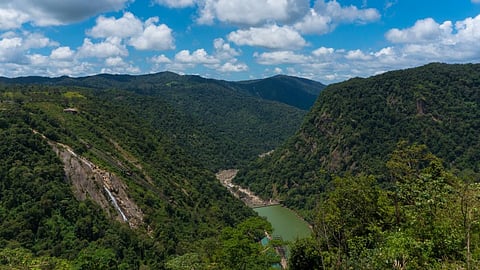

Engineering giant Larsen & Toubro (L&T) has lost a legal battle against Karnataka Power Corporation Ltd (KPCL), with the Karnataka High Court ruling in favour of KPCL regarding the tender process for the Rs 8,300 crore Sharavathi Pumped Storage Power Project. L&T, which did not participate in the tender, raised objections, alleging that the process was conducted with undue haste.
This project is part of KPCL’s efforts to address Karnataka’s electricity shortage. Down To Earth previously reported that the tendering process for the pumped storage was initiated on February 2, 2024 and lasted only 21 days. The timeline provided for contractor inquiries and clarifications was notably brief, spanning just four days.
Justice M Nagaprasanna, presiding over the single-member bench, dismissed L&T’s plea, stating that a non-participant in a tender process should not seek to halt it. L&T then appealed, contending that the 21-day tender period was unusually short, typically requiring at least 90 days, arguing that this was meant to benefit specific bidders.
However, the division bench, chaired by Chief Justice NV Anjaria and Justice Krishna S Dixit, affirmed the legitimacy of the tender process, noting that KPCL had the authority to determine tender timelines and that L&T had participated in the pre-bid phase, making their objections inconsistent.
The project was subsequently awarded to engineering and infrastructure major Megha Engineering and Infrastructures Ltd, marking a significant step forward for KPCL’s power generation plans.
On March 11, 2024, the HC issued a stay order on all proceedings related to Sharavathi Pumped Storage Power Project’s short-term tender. This decision was made by the division bench, following L&T’s appeal challenging the single judge’s ruling on March 6, which had dismissed the petition.
Despite the stay order, KPCL had already issued a letter of award for the project to one of the bidders before the single judge’s order was made public. L&T argued the 21-day tender period was inappropriate for tenders exceeding Rs 2 crore, as stipulated by the Karnataka Transparency in Public Procurements Act, 1999.
KPCL countered that L&T was not qualified to participate, lacking experience in electro-mechanical and hydro-mechanical works.
The current power shortage in Karnataka is due to a decline in generation and increasing demand. The state experienced a peak demand of 16,950 megawatt (MW) on August 23, 2023, significantly higher than the 11,268 MW in August 2022.
This rise in demand was attributed to poor monsoon rains, leading to increased agricultural irrigation and further boosting overall power demand. To mitigate the power crisis, Karnataka plans to procure electricity from neighbouring states and establish power-swapping agreements with Uttar Pradesh and Punjab.
To further address this shortfall, the state is considering various measures, including purchasing electricity through day-ahead and real-time markets and procuring 1,250 MW of power via a short-term tender. The proposed Sharavathi river project, which has a capacity of 2,000 MW, will involve using Talakalale as the upper reservoir and Gerusoppa as the lower dam, with a five-year implementation timeline.
The adoption of pumped storage hydropower aims to address energy fluctuations in the grid caused by solar and wind energy. KPCL collaborated with public sector enterprise WAPCOS under Ministry of Jal Shakti, to develop the detailed project report.
The energy department also plans to install additional solar grids on unused land within existing power plant premises.
In a broader vision, the Karnataka government aims to increase the state’s power generation capacity to 60,000 MW within the next seven years, doubling the current capacity of 32,000 MW. During a recent event, Chief Minister Siddaramaiah highlighted the importance of renewable energy in this endeavour, with 63 per cent of Karnataka’s power generation currently derived from renewable sources.
The Union Ministry of New and Renewable Energy (MNRE) has proposed a sustainable solution to provide reliable daytime power to irrigation pump sets through feeder-level solarization under Centre’s energy security scheme Pradhan Mantri Kisan Urja Suraksha evam Utthaan Mahabhiyan.
The initiative aims to reduce reliance on conventional sources by installing solar power plants near substations. Karnataka has already made significant progress in decentralised solar power plant installations, with MNRE providing central financial assistance to support these efforts.
To encourage farmers to adopt solar pump sets in agriculture, the Karnataka government has increased the subsidy from 30 percent to 50 percent, with the government covering up to 80 percent of the total pump set cost, including the Centre’s 30 percent subsidy. This initiative is part of a broader strategy to promote sustainable energy practices and empower farmers with solar energy solutions.
Gaurav Gupta, additional chief secretary of the state government’s energy department, stressed the importance of solar power for a sustainable future, stating that embracing solar pump sets not only ensures efficient irrigation but also leads to a greener and more sustainable Karnataka.